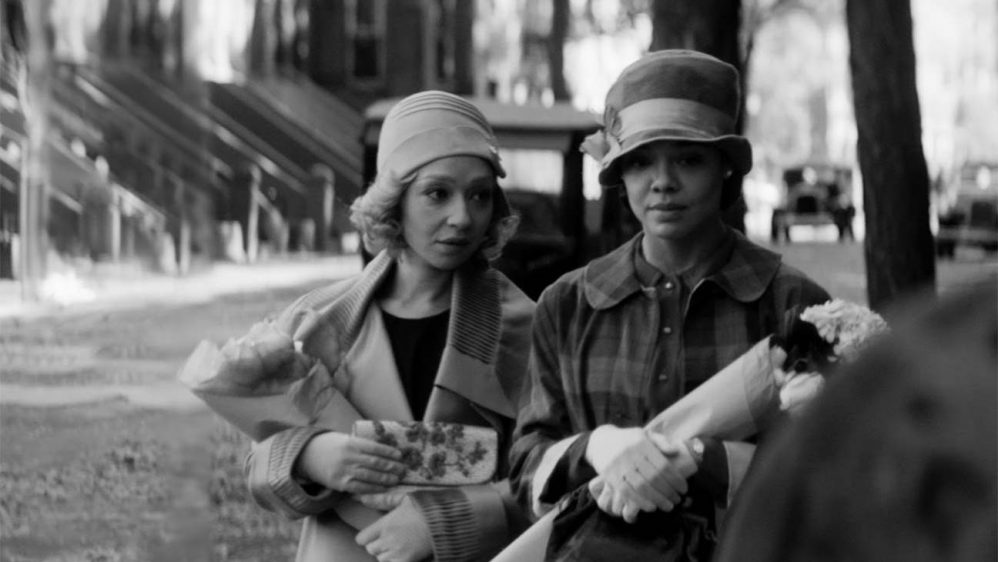By Noah Gittell
“Passing” is a complicated film. Based on a 1929 novella by Nella Larsen, it is the story of a Black woman who has successfully convinced the world, including her unsuspecting husband, that she is White. It’s a story that concerns issues of race, identity, and even sexuality that many filmmakers would be hesitant to address. Perhaps it took the zeal of a first-time director. “Passing” is the directorial debut of veteran actor Rebecca Hall, who demonstrates a keen and perceptive sense of visual storytelling but ultimately gets lost in the story’s complications.
Filmed in black-and-white and in a tight 4:3 aspect ratio, “Passing” is a story uniquely told through its faces. Most period pieces luxuriate in their production details, but Hall boxes them out, instead picking up every nuance in her actors’ expressions. When Reenie Renfield (Tessa Thompson) meets her old friend Clare (Ruth Negga) at afternoon tea at a lavish New York hotel, she honestly doesn’t recognize her at first. But her eyes suddenly light up with recognition as she sees the young Black girl she once knew hiding behind the blonde hair, extravagant clothes, and White husband. Through her eyes, we see her, too.
Much of the story’s power is derived from how it subverts our expectations. We might expect Reenie to be lured into Clare’s deception, but after an awkward encounter with Clare’s racist husband, Reenie leaves her alone. Instead, it’s Clare that comes calling for Reenie at her Harlem brownstone, perhaps seeking the authenticity she has traded away. Reenie acquiesces out of kindness, and soon Clare becomes a regular fixture at their home, befriending the children, the maid, and most notably, Reenie’s physician husband (André Holland). The situation unsettles Reenie, and Thompson marvelously captures how the dread grows almost imperceptibly behind her placid exterior. To Reenie, there is a vague sense that Clare is trouble, although what specific kind doesn’t reveal itself until the final scenes.
By then, however, your attention may have strayed. The first half of the film generates an almost breathless excitement in its ability to handle sensitive subject matter with competence and artistry, but the promise quickly recedes. Too many issues are raised; race, sexuality, class, identity. None of them are actually explored, which makes the characters’ motives unclear. During a key act of violence, for example, I found myself unable to determine, first, if it was international, and if so, why exactly it was committed. A film told more lyrically might be able to survive such uncertainty, but “Passing” tries to split the difference between realism and expressionism, and the result is a muddled narrative that strains both for emotional catharsis and real-world ambiguity, and it ultimately gets stuck in the middle.
And yet the film still sparkles with breathtaking imagery and exquisite framing. There’s a moment when Reenie passes between two mirrors in her home and her face blurs ever-so-slightly. It only lasts a second, but it lingers in the mind. These moments, however, feel like poignant interstitials in a film that too often stays outside its characters. “Passing” is clearly the work of a smart and competent filmmaker with better films in her future, but it succumbs to the fatal flaw of so many debuts by actors-turned-directors: Hall respects her actors too much, counting on them to tell the entire story in their reactions, rather than using the other tools of filmmaking to shape the narrative more firmly. There are precious few moments in “Passing” when a character actually speaks their mind, and ultimately, it’s mysteries become too much to bear.
In the end, it even betrays its actors, who do sharp, compelling work in service of a story that doesn’t adequately support them. The three leads give rich performances as complex characters struggling to understand their inner turmoil, but there is nowhere for them to go. The relationship between Reenie and Clare never evolves. No character arc is ever visible, and no real story emerges. “Passing” is a beautiful idea, well-conceived in its details, but never finds the stroke of authenticity that it claims to understand.
“Passing” is now in theaters and will stream on Netflix starting November 10.















